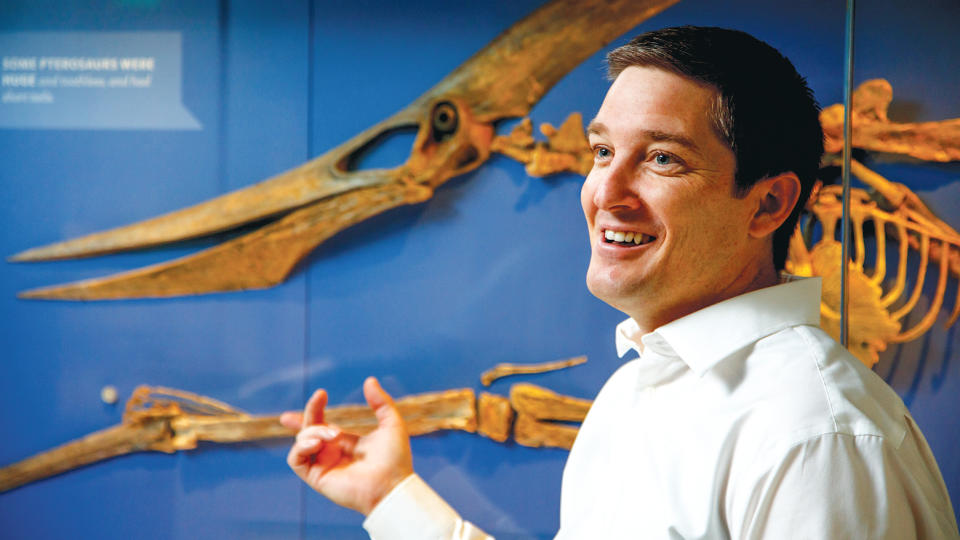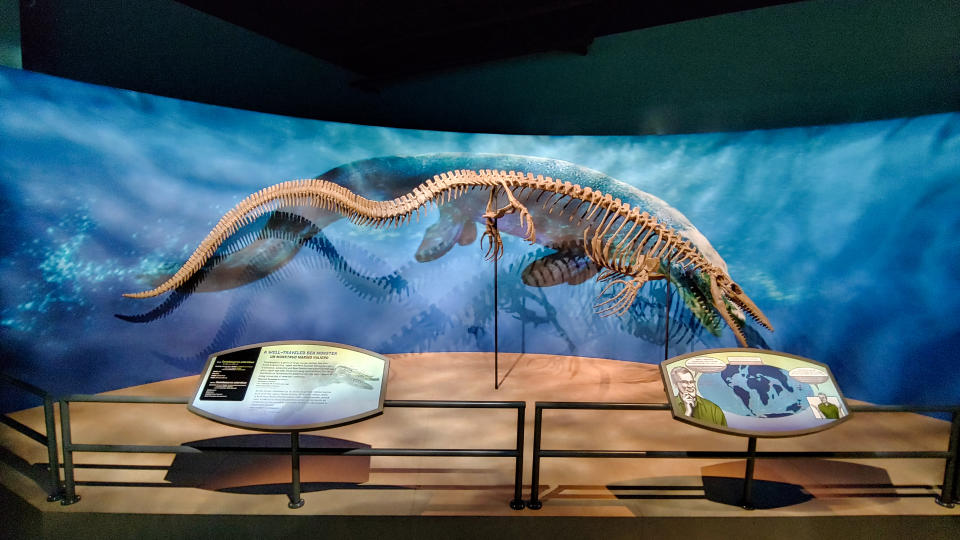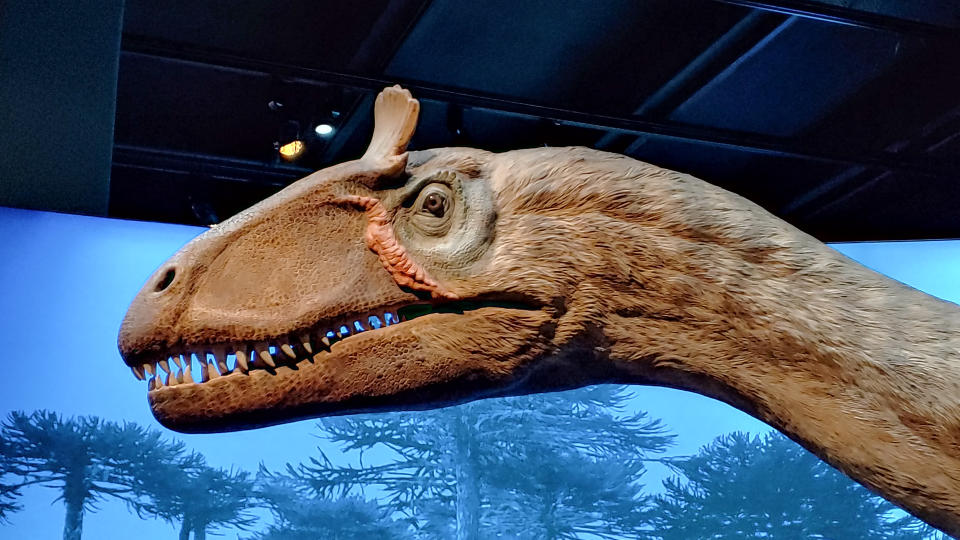Turn Your Job Into an Adventure With Career Advice From a Fossil Hunter

From April 3, 2019, to Jan. 5, 2020, the Natural History Museum of Los Angeles County (NHM) will be home to an exhibition known as Antarctic Dinosaurs, featuring two newly discovered species from the South Pole. Through graphic novel-like artwork, informative videos and interactive design, guests will learn exactly what the Antarctic explorers went through on their expedition to find the long-lost creatures. The show is the culmination of years of work and something guests of all ages will enjoy — adult tickets cost $22.
GOBankingRates was lucky enough to get a sneak preview, as well as a chance to speak with one of NHM’s adventurer-scientists, associate curator Dr. Nathan Smith, about his Antarctic expedition and fascinating career. It turns out, he had some pretty great advice for those who don’t routinely go on wild explorations to the South Pole, and instead work a normal 9-to-5.
Check Out: The World’s Best Museums You Can Visit for Free

You’re a seasoned explorer, making expeditions to places like Argentina, China and, of course, the Antarctic, but that is just a small part of your job. Can you give a little more insight into what your day-to-day looks like?
Our day-to-day is very similar to other scientists and other people in terms of sitting in front of a computer. As a curator, I have to wear a bunch of different hats. I manage a team in our department that is repairing fossils, cataloging and curating collections and providing access to those specimens for other researchers and educators. I’m constantly working on papers and grants to publish our research and to generate more funding for analysis and expeditions and things like that. It’s a lot of different plates to balance, but that’s one of the fun parts of the job — it never seems monotonous.
I read that you had to go to “snow school” before your expedition. Can you speak a little more about the training you had to undergo?
Yes, so “snow school” — or sometimes they call it “Happy Camper” — is run by the United States Antarctic Program, and it is a two-day survival training thing. A big part of it is going through what goes out with you, like a 60-pound survival bag, which is meant for if you get stuck or can’t get out or bad weather comes in. You have sleeping bags, a tent, food, a stove, an HF radio and a bunch of things that can tide you over until help can get out to you. So, Happy Camper is designed to go through working with all that gear, but also kind of a psychological and philosophical understanding of how to evaluate risk and think about what you should and should not be doing.
A big part of it is meant to tamp down the egos of scientists, who assume they’re experts at everything.
For Your Career: The 10 In-Demand Skills Employers Want Right Now
Speaking of survival, obviously there are inherent dangers in the Antarctic. Did you face any on your expedition, be it dangerous wildlife or lack of food?
There are no wild animals out where we [were]. The worst is little nematodes in the soil that you can’t even see, so we don’t have to worry about them. Around the coast, the joke is that the skuas are the most dangerous thing. [They’re] these brown-gray gulls that will try to snatch a meal off of your cafeteria tray as you’re walking outside with it.

And food, we actually eat really well. You get a lot of food and a diversity of food, and no food shaming for going back for seconds or thirds! It tends to be a lot of [mixed] things like stir fry or casserole. The chefs down there are amazing.
You’re obviously game for an adventure — especially if it leads to a major scientific discovery! How would you recommend people apply an adventurous spirit to their own careers?
I’d say that one of the best things that can be applied from what we do is just this idea of … not keeping blinders on, thinking, “I’m going to do it this way because it’s always been done this way.” Paleontology especially — because it is so interdisciplinary — we constantly have to be jury-rigging things together and borrowing analytical methods and techniques from other fields … to work with data that is not standard or normal.
So, that, I think, is a skill or a mindset you can bring to almost any career: Be open to trying new things and trying to answer your questions in a new way.
Options: 20 Highest-Paying Jobs That Let You Travel the World
Would you feel fulfilled in your professional life if you didn’t get to go on expeditions periodically?
For me personally, I need to get out there … It is my favorite part of the job. The best part of the gig is getting out on those expeditions.

You were fascinated by dinosaurs and science as a kid. Did you ever think you’d make those things into your career?
No, it took a while. I have a lot of colleagues who are paleontologists and it was like from the age of three on, it was their singular focus and they knew that they wanted to do it. I took a circuitous route. In college, I was originally a chemistry major, but then I got really into evolutionary biology. By chance, I had a class with a paleontologist who ran a summer field program in the White River Badlands. So, me and a few pals went out West on this field trip with him the first summer of our freshman year, and I just immediately fell in love with it. I hadn’t been that far west before, hadn’t seen those open expanses of rock or collected fossils before. I was just sold from that point on.
Sometimes finding your calling happens that way.
It does, and it is something we’ve tried actively at the museum [to do] with our education programs … where we take a lot of underrepresented groups out for field experiences. They are getting a chance to be immersed in this experience, and … the more that we can find ways to do that for people, the more people will be aware of … the myriad of careers that involve working with this kind of data.
On that note, would you say visiting NHM is the best way the average person can contribute to science without making it their full-time job?
I would say that for folks who are lucky enough to have a natural history museum in their area, the first step would be — and this is going to sound like a pitch — but go and sign up as a member, because that is how you get the most access to traveling exhibits and to see everything, and you can do it on your schedule. For the folks who are a little more serious and want to participate in the process, join our Community Science Program. It’s really opening up [opportunities] for the average person to participate in museum science.
In the past, these things would have been described as hobbies — people going out and doing bird watching or collecting things on nature hikes — but now we’re at the point where you can actually contribute data to the field as well. And, oftentimes, it is as simple as taking a picture and GPS-ing it on your phone.
Is there any way for people to turn their passion for science into a side hustle and not just a hobby?
Well, even the scientists aren’t getting rich doing this, so that’s a tougher question! … A lot of big universities and school campuses will have programs available for [things like] psychological testing, where students and other folks can make a little bit of money [participating] in trials. Those are a much more passive experience in the scientific process though.
But, something I can say, is that by being involved in … programs like the one at NHM, coming together and meeting people who are interested in the same thing, it’s the ideal way to network. You’ll get exposed to much broader, diverse networks than you would by going to a conference for your specific discipline.
Try: 101 Side Business Ideas and How to Start Without Quitting Your Job
Do you feel paleontology is a dying industry?
It is not a dying industry. That’s kind of an old view of it — that it’s dying, and that paleontologists are just stamp collectors who go out and collect things and put them in dusty old drawers, write papers that nobody reads and don’t really interact with [people] because they’re social pariahs.
Thankfully, that has changed a lot. And, paleontology is becoming more and more important to understand our modern biodiversity and climate change. Because when we think about what is going on in the world today and how our biodiversity is being affected … if we want to put things in context, we’re always going to have to go back to the fossil record.
[Without paleontology], it would be like making predictions about where the S&P 500 is going to go and you only have yesterday’s data.

How does teamwork play a role in your job?
We work together constantly. Pretty much every project I’m involved in is a collaborative project with other researchers. And that holds true in the field research side of things, too. Teamwork is really, really important when you’re out in [remote] places … [because] you need to have people who get along together. A common misconception about Antarctic expeditions is that it is a bunch of beefy guys with beards that are all macho, and it’s like no, no, no, those are usually the worst people to have out there! It is people who are smart, intellectually curious and work well together.
So, what you’re saying is there are no lumberjacks allowed on your expeditions.
I’m not going to denigrate lumberjacks! I’m sure there are a lot of intellectually curious lumberjacks.
Does passion play a role?
You need to have that passion because that’s going to be what you rely on when you’re feeling dejected, your experiments aren’t working, your papers aren’t coming together and you feel like you’re never going to finish up that dissertation you’ve been putting in 18-hour days working on. If you don’t love it, you’re going to get to a point where you realize it isn’t worth it to kill [yourself] and put in the effort.
Paleontologists are pretty passionate across the board then.
[O]n our paleontology digs, we bring in volunteers or folks from other areas, and you’ll find some retired or midcareer bankers that had this midlife crisis and now want to come out and hunt for fossils with us. So far, I don’t know any paleontologists who have had a midlife crisis and decide they want to become a CPA. So that’s a good sign for us!

You have a pretty cool job, discovering dinosaurs and traveling to distant places. What are your hobbies outside of your work? How do you de-stress?
I enjoy woodworking. After 10 years in Chicago and D.C., living in apartments, I finally have a house with a little garage now, so, I have my little shop set up. Working with your hands and applying some kind of scientific method is a good combination for me.
I also used to, unsurprisingly as a former Chicagoan, play softball. I haven’t gotten anything going yet in L.A. or Long Beach. I need to look more into that. So, if you have any readers out there who need a third baseman, have them give me a shout.
Career Goals: Feel Like You’re Retired With One of These 20 Laid-Back Jobs
What is the proudest moment in your career thus far?
The Antarctic expedition is the easiest one to pick if you allow me to shoehorn a bunch of things in there. Planning and organizing with colleagues to get the camps in there, getting a successful grant application, making the discoveries in the field, running the expedition and getting everyone back safe and, now, after years of work, having the exhibit brought to life by pushing everything in there. That might be cheating to include all of those.
I’ll allow it.
I just feel like the exhibit represents the outcome of all these other things that we’ve worked very hard on! So it is a proud moment for me and a bunch of my colleagues.
Click through to read about more career lessons.
More on Jobs
We make money easy. Get weekly email updates, including expert advice to help you Live Richer™.
This interview has been edited and condensed.
This article originally appeared on GOBankingRates.com: Turn Your Job Into an Adventure With Career Advice From a Fossil Hunter
